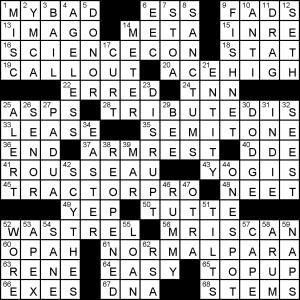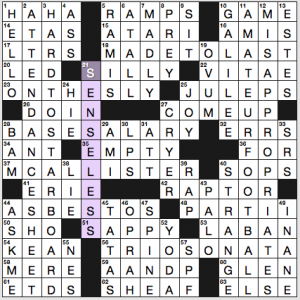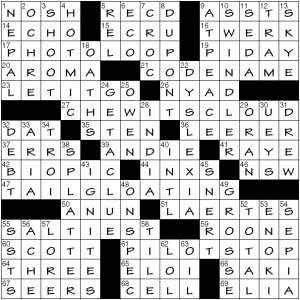Jacob Stulberg’s New York Times crossword—Amy’s write-up
l dunno, folks. I show up looking for a challenging themeless puzzle and I get a 72-worder with a small theme, it feels like a rip-off. (Your mileage and enchantment may vary.) We’ve got INANE clued as 49d. [Foolish … or, when read as three words, how this puzzle’s other four “foolish” answers are arranged]. There are four other answers clued with [Foolish], and they’re interlocked IN AN E. SILLY, EMPTY, and SAPPY are the horizontals and SENSELESS is the big E’s vertical. We’re 15 days from April Fools’ Day, so it feels a bit odd to have this “foolish” mini-theme running on St. Patrick’s Day.
The rest of the puzzle is themeless, but there are just 10 entries (not counting SENSELESS) with 8+ letters, and they didn’t really bring a lot of zing to the table. HARD TO STARBOARD and AMATEUR FOOTBALL are among the four 15s (I find ’em dull), and I like MADE TO LAST. But mostly the puzzle felt like a five-word theme plus a whole bunch of 3- to 5-letter answers. I guess the whole thing felt inane, senseless … and hence so very meta.
Three more things:
- 14a. [HH], ETAS. Because with ETDS in the grid, this can’t be clued at estimated times of arrival. Not a fan of plural Greek letters as crossword answers, not a fan of using a regular Roman-alphabet H to clue ETA. (Does eta take the same serifs in Greek fonts that our H does? Font experts and Hellenophiles, weigh in!)
- 37a. [Fort ___ (Civil War landmark near Savannah)], MCALLISTER. Is this well-known? I don’t recall hearing the name before. If you wonder why it wasn’t clued as the Home Alone character Kevin, it’s because that character’s surname is McCallister.
- 1d. [When its second syllable is drawn out, “Are you out of your mind?!”], HELLO. My favorite clue tonight.
Three stars from me.
Steven E. Atwood’s Chronicle of Higher Education crossword, “Aloha Moment” — pannonica’s write-up
This isn’t about hellos or goodbyes, or even about Hawaiʻi. The key is recognizing that the title is intended to be parsed as an aha moment that’s had the bigram lo inserted—so it’s kind of meta. Theme answers follow the same pattern. Behold:
- 17a. [Slide show set to repeat?] PHOTO {LO}OP.
- 27a. [What a cow might do in heaven?] CHEW ITS C{LO}UD.
- 47a. [Trash talk from the peacock with the best courtship display?] TAIL G{LO}ATING. This one is slightly different than the others in that word spacing is altered.
- 61a. [Hangar?] PI{LO}T STOP.
These work pretty well.
- 19a [Observance that falls on the anniversary of Einstein’s birth] PI DAY, which was this past Tuesday. Last Friday’s CHE had a PI DAY theme. Speaking of callbacks …
- 14a [Mythical lover of her own voice] ECHO. I don’t think this is right. Echo was said to have a lovely voice and also to be talkative (famously running interference against Hera for a philandering Zeus), but self-love was the attribute of her partner-in-myth-LORE (57d), Narcissus.
- 21a [Deep Throat, for one] CODE NAME, for crossword-friendly MARK FELT.
- 23a [“Accept that nothing can be done”] LET IT GO. With the first five letters in, I without consulting the clue completed the fill as LETITIA. Then LET IT BE.
- 32a [Common computer-file extension] DAT. Typically a, get this, data file. I wonder how many solvers will be familiar with it, even if it is common.
- Row 9 spotlight! 44a [Bad that won five VMAs in 1988] INXS, 46a [State where 44 Across formed: Abbr.] NSW (New South Wales, Australia). The 42a BIOPIC of frontman Michael Hutchence is in the works, and it’s called Authentic.
- Stacked pen names of British authors: 66a [Noel Coward wrote an introduction for an edition of his complete works] SAKI, aka H[ector]H[ugh] Munro (1870–1916); 69a [Lamb handle?] ELIA, aka Charles Lamb (1775–1834).
- 11d [Actor Jon of “Chicago P.D.” and “Chicago Justice”] SEDA. Unknown to me. Does he know singer Jon SECADA, from the band Chicago? Oh wait, I’m confusing that guy with Peter CETERA.
More good fill through the grid, but I don’t feel like being exhaustive, so I here bid adieu.
Paul Coulter’s LA Times crossword – Gareth’s review

LA Times
170317
I didn’t understand the theme at all until the very last square of the puzzle. It’s very elegant, even if it doesn’t make for rolling-in-the-aisles wacky asnwers. The prefix of four answers is decapitated and placed at the end, creating new, two-part phrases. CONSCIENCE becomes SCIENCECON; DISTRIBUTE changes to TRIBUTEDIS; PROTRACTOR is transformed into TRACTORPRO; and PARANORMAL is reworked to be NORMALPARA.
WASTREL, [Spendthrift] is a word that is underused in everyday speech.
Would you like [The GOP’s country] as a clue for USA?
3.75 Stars
Gareth


Two of the NYT theme answers seem off to me. First, while a “sap” is a fool, would you ever use the word “sappy” to describe the behavior of a sap? To me, sappy means overly sentimental, cheesy, insipid. But not foolish. Similarly, can you really interchange “empty” and “foolish”?
I felt particularly foolish getting stuck on the Biblical mount clue.
Good point about SAPPY! (And also EMPTY.) If I’d been blogging before 10:30 Central, I might have been alert enough to note that.
The Biblical mount must have fooled many of us, including me.
The dictionary says “lacking in good sense : silly”. Some people obviously use the word “sappy” to describe the behavior of a sap.
It also has a sense “foolish” for “empty,” but I should avoid mutiple links.
Even though you emptied my bank account and have left me to run off with my brother, I will always cherish our special, perfect times together. Is that sappy without being foolish?
I am in the camp that empty promises can be foolish and sappy comments can be foolish. I didn’t have a problem with either synonym.
I do agree that the puzzle was unusually easy for a Fri. More like a Wed. for me.
Steve
Today’s NY Times Crossword Puzzle: A Clever Layer Cake of Subtle Biblical Allusion
I don’t know the constructor of today’s puzzle, Jacob Stulberg, or anything about him, but I’d be willing to bet a few shekels that he is pretty knowledgeable about the Torah. I am so confident in this assertion, because there is an erudite yet playful Biblical theme hidden in plain sight in today’s puzzle, which is overtly merely on the theme of what is “inane” or “foolish”. That hidden Biblical theme is the icing on a layer cake of clever connections I will now unpack for you, step by step.
First, there are three clues which each has a Biblical resonance:
4D: Biblical mount = ass
10D: Region bordering Lebanon = Galilee
53A: Jacob’s father in law = Laban
Second, if you knew the Torah story of how Jacob first marries Leah and then Rachel, you knew right off that the answer to 53A was “Laban” (who is actually doubly the father in law of Jacob). Bu if, after you’d completed the entire puzzle, you took a final look at the filled-in grid, you might have recalled not only that Jacob flees from Laban’s house into an area just south of the Sea of “Galilee” (10D), but also that Jacob’s flight from Laban was “on the sly” (20A: Sub rosa) because Jacob “misappropriates” (12D Embezzles, e.g.) Laban’s household gods. Just a random coincidence?
Well, that brings us to the third layer. If you were a serious “Yeshiva Bucher” (or like myself, a secular Jew who has seriously studied the complex multi-authorial origins of the Bible, including Richard Elliot Friedman’s claim that the David stories in the Book of Samuel are actually the second half of what Harold Bloom dubbed “the Book of J”), you’d have also known that LABAN in that first half has his counterpart (both in the literal reversal of letters in his name, but also in his conflict with the hero) in that second half in the character of NABAL, the rich Calebite whose wife Abigail (just like Rachel) flees his home “on the sly” with David (whom she eventually marries), and “misappropriates” her husband’s property!
But here’s the punch line — “nabal”, in Hebrew, means “foolish”—-which of course is the overt theme of this puzzle! So I quickly realized that this must be Stulberg’s way of winking to the Torah-savvy solver that this subtext is not a mirage, it’s real!
And that brings us to the fourth and perhaps most exquisite, layer of this covertly Torah-themed puzzle. Take a closer look (or should I better say, a closer listen) to the master theme clue of this puzzle, 49D:
“Foolish….or, when read as three words, how this puzzle’s other four ‘foolish’ answers are arranged”
The answer to 49D is “inane”, which when read as three words, becomes “in an e” –which superficially does describe the way those other four “foolish” answers are arranged in the grid –i.e., in the shape of a capital letter “E”, with (21A) “silly”, (35A) “empty” and (51A) “sappy” being the three horizontal parts, and (21D) “senselessly” being the vertical part whence the other three spring to the right.
But……when you listen to the sound of the three words “in an e” as spoken aloud, does it ring any bells for you? It sure did for me — I quickly realized that these three words in English sounded almost identically to three rather famous words in (where else?) the Torah—specifically in Genesis 22:1, when Abraham first responds to God calling his name:
“And it came to pass after these things, that God did tempt Abraham, and said unto him, Abraham: and he said, Behold, here I am.”
You see, “here I am” in Hebrew is pronounced “hi-nei-ni” – and that’s anything but inane or foolish! And I hear in that hidden “hineini” the voice of Jacob Stulberg, the “god” of this puzzle, making his final announcement to the solver who has gotten this far, confirming that “Yes, here I am, and how do you like my clever puzzle?”
Cheers, ARNIE
@JaneAustenCode onTwitter
Thank you for this, Arnie. I didn’t get most of it, nor would I ever, but I loved the puzzle and gave it five stars earlier, partly for some of these answers. Glad you like Jane Austen, too.
It’s fascinating that Jason has had at least one puzzle a month in The NYT since October. And these are only the ones that got accepted. Wonder how many crosswords he submits to Will every week.
Jacob. Your comment is interesting, Michael. I love to do Stulberg’s puzzles. I already thought he was pretty intense about creating his puzzles, and then I was startled by Arnie’s comment above.
Jacob. Of course! [Slaps head]
I’m not familiar with Jacob’s level of intensity about making crosswords, but Arnie’s overanalysis was definitely beyond commenting on the obvious. He is my prime suspect for being a closet conspiracy theorist. ;)